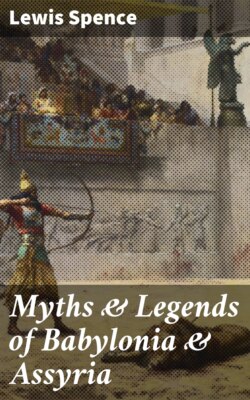Читать книгу Myths & Legends of Babylonia & Assyria - Lewis Spence - Страница 6
На сайте Литреса книга снята с продажи.
The Akkadians
ОглавлениеWho, then, were the Akkadians whom the Babylonian Semites came to displace but with whom they finally mingled? Great and bitter has been the controversy which has raged around the racial affinities of this people. Some have held that they were themselves of Semitic stock, others that they were of a race more nearly approaching the Mongol, the Lapp, and the Basque. In such a book as this, the object of which is to present an account of the Babylonian mythology, it is unnecessary to follow the protagonists of either theory into the dark recesses whither the conflict has led them. But the probability is that the Akkadians, who are usually represented upon their monuments as a beardless people with oblique eyes, were connected with that great Mongolian family which has thrown out tentacles from its original home in central Asia to the frozen regions of the Arctic, the north of Europe, the Turkish Empire, aye, and perhaps to America itself! Akkadian in its linguistic features and especially in its grammatical structure shows a resemblance to the Ural-Altaic group of languages which embraces Turkish and Finnish, and this is in itself good evidence that the people who spoke it belonged to that ethnic division. But the question is a thorny one, and pages, nay, volumes might be occupied in presenting the arguments for and against such a belief.
It was from the Akkadians, however, that the Babylonian Semites received the germs of their culture; indeed it may be avowed that this aboriginal people carried them well on the way toward civilization. Not only did they instruct the Semitic new-comers in the arts of writing and reading, but they strongly biased their religious beliefs, and so inspired them with the idea of the sanctity of their own faith that the later Babylonian priesthood preserved the old Akkadian tongue among them as a sacred language, just as the Roman priesthood has retained the use of the dead Latin speech. Indeed, the proper pronunciation of Akkadian was an absolute necessity to the successful performance of religious ritual, and it is passing strange to observe that the Babylonian priests composed new religious texts in a species of dog-Akkadian, just as the monks of the Middle Ages composed their writings in dog-Latin!—with such zeal have the religious in all ages clung to the cult of the ancient, the mystic and half-forgotten thing unknown to the vulgar.
When we first encounter Babylonian civilization we find it grouped round about two nuclei, Nippur in the North and Eridu in the South. The first had grown up around a sanctuary of the god En-lil, who held sway over the ghostly animistic spirits which at his bidding might pose as the friends or enemies of men. A more 'civilized' deity held sway at Eridu, which was the home of Ea, or Oannes, the god of light and wisdom, who exercised his knowledge of the healing art for the benefit of his votaries. From the waters of the Persian Gulf, whence he rose each morning, he brought knowledge of all manner of crafts and trades, arts and industries, for the behoof of his infant city, even the mystic and difficult art of impressing written characters on clay. It is a beautiful picture which we have from the old legend of this sea-born wisdom daily enlightening the life of the little white city near the waters. The Semites possessed a deep and almost instinctive love of wisdom. In the writings attributed to Solomon and in the rich and wondrous Psalms of David—those deep mines of song and sagacity—we find the glories of wisdom again and again extolled. Even yet there are few peoples among whom the love of scholarship, erudition, and religious wisdom is more cultivated for its own sake than with the Jews.
These rather different cultures of the North and South, working toward a common centre, met and fused at a period prior to the commencement of history, and we even find the city of Ur, whence Abram came, a near neighbour of Eridu, colonized by Nippur! The culture of Eridu prevailed nevertheless, and its mightiest offshoot was the ultimate centre of Euphratean civilization—Babylon itself. The first founders of the city were undoubtedly of Sumerian stock—the expression 'Sumerian' being that in vogue among modern scholars for the older 'Akkadian,' and therefore interchangeable with it.
